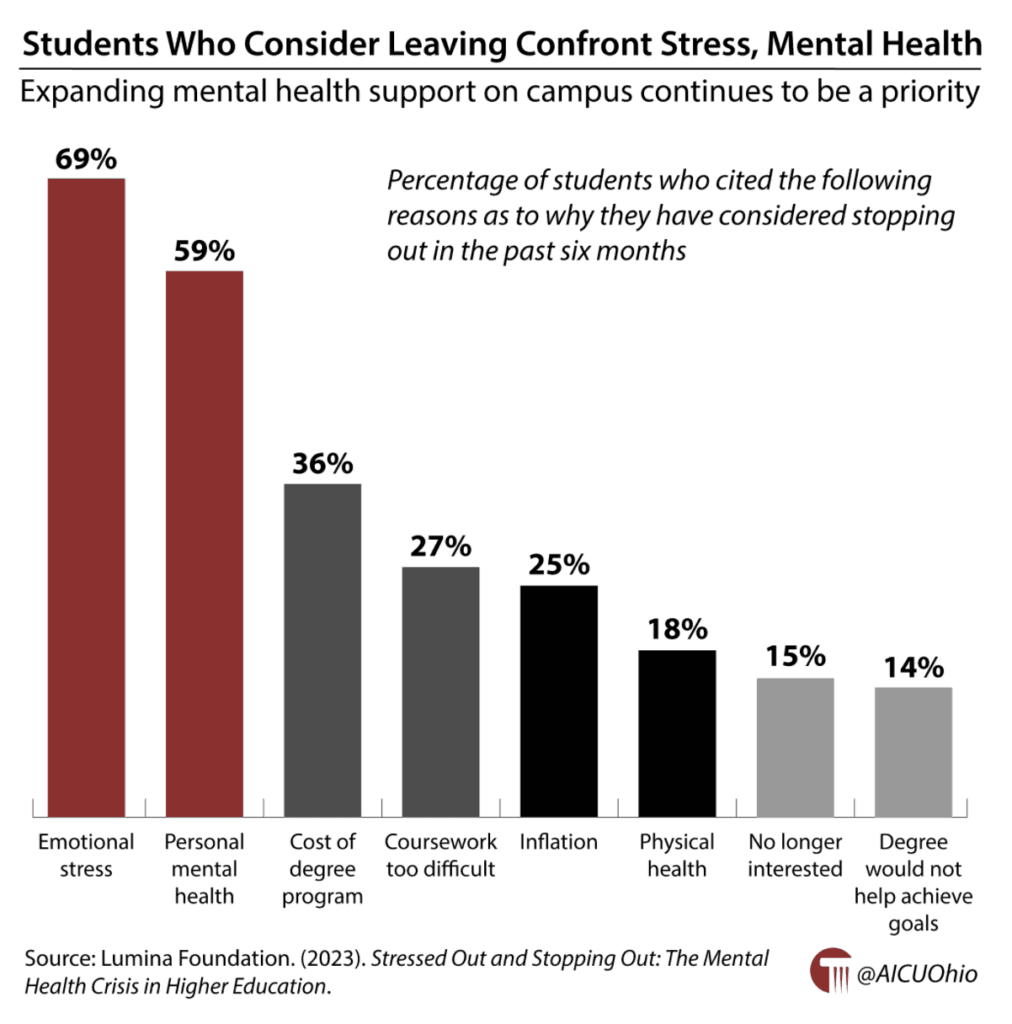Kazi McDowell (LEFT) and Sigrid Solomon discuss the 2024 implementation of the mental health grant.
Grant Will Bolster Counseling Staff, Fund Training Materials, Purchase CALM App for Students
A national survey conducted earlier this year revealed that mental health challenges were the predominant reasons for college students considering stopping out of school this year.
The Lumina Foundation’s 2023 report, “Stressed Out and Stopping Out: The Mental Health Crisis in Higher Education,” found that 69 percent of those students surveyed suffered from emotional stress and 59 percent cited personal mental health for either leaving or considering stopping out of their college or university.
Those factors far outweigh such other rationales as cost, difficult coursework, inflation and physical health. Such revelations prompted the Ohio Department of Higher Education to distribute $20 million to Ohio’s higher education institutions over the next two years. It allocated $93,276 to Wilmington College in support of mental health services and programming for calendar years 2024 and 2025.
Sigrid Solomon, vice president, chief student affairs officer an dean of students, noted that this year’s first-year college students were high school freshmen when the pandemic hit in the winter of 2020 and many experienced remote learning modes, periods of isolation and fewer opportunities for socialization. “They come to college with a profoundly unique experience,” she said. “Since COVID, colleges and universities are seeing more students having some adjustment and anxiety challenges. Extra attention is needed for them to become more fully engaged.”

Kazi McDowell, director of counseling, added that some students took courses online in high school and had sports and other extracurricular activities either canceled or offered with less social interaction.
“Many haven’t had those normal social experiences in high school and some students are experiencing challenges with social cognitive development, which wasn’t a priority at many high schools during the pandemic,” she said. “Some students didn’t learn the coping skills and have the social experiences during their time in high school, which historically has been a time for learning to become independent and learning some of those executive skills.”
Executive skills include the ability for self-control, planning, time management, task initiation, keeping focused and persevering through a challenging task.
Solomon said the funds will be used to increase campus-wide knowledge and awareness of available care options, increase the availability of care options, remove barriers to care options and be leveraged to create long-term sustainability on campus and support collaborative, community-based programs and initiatives.
A part-time counselor will be hired to provide an additional 20 hours a week of mental health services and the College will purchase Mental Health First Aid materials to use in training students, faculty and staff, and 500 licenses for the CALM app will be purchased for student use. This app is designed to help students access meditation, healthy sleep tools, positive podcasts and music for focus/attention. Also, the grant will cover materials and supplies designed to increase awareness of mental health services on campus and it will allow the College’s popular Hammock Park to expand as an attraction for relaxing, getting outside and enjoying the fresh air.
McDowell said students need to realize that help is easily accessible on WC’s campus. Solomon also added, “We want to destigmatize going to counseling and make it a more normal part of students’ formula for success. Self-care is important for all of us.”
